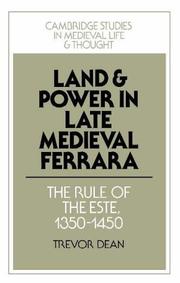| Listing 1 - 5 of 5 |
Sort by
|
Periodical
Abstract | Keywords | Export | Availability | Bookmark
 Loading...
Loading...Choose an application
- Reference Manager
- EndNote
- RefWorks (Direct export to RefWorks)
Emilia-Romagna (Italy) --- History --- Regione Emilia-Romagna (Italy) --- Italy --- Emélia-Rumâgna (Italy) --- Emilia (Italy)
Book
ISBN: 8822229177 9788822229175 Year: 1980 Volume: 155 Publisher: Firenze: Olschki,
Abstract | Keywords | Export | Availability | Bookmark
 Loading...
Loading...Choose an application
- Reference Manager
- EndNote
- RefWorks (Direct export to RefWorks)
Italian literature --- History and criticism --- Emilia-Romagna (Italy) --- Civilization --- -Ottovolante (Group of writers) --- -Civilization --- -History and criticism --- -Regione Emilia-Romagna (Italy) --- Emélia-Rumâgna (Italy) --- Ottovolante (Group of writers) --- Regione Emilia-Romagna (Italy) --- Emilia (Italy) --- Civilization. --- Italian literature - Italy - Emilia-Romagna - History and criticism --- Emilia-Romagna (Italy) - Civilization
Book
ISBN: 8886712030 9788886712033 Year: 1995 Volume: 3 Publisher: Forli: ABACO,
Abstract | Keywords | Export | Availability | Bookmark
 Loading...
Loading...Choose an application
- Reference Manager
- EndNote
- RefWorks (Direct export to RefWorks)
Excavations (Archaeology) --- Archaeological museums and collections --- Guidebooks. --- Archaeological collections --- Anthropological museums and collections --- Antiquities --- Museums --- Archaeological digs --- Archaeological excavations --- Digs (Archaeology) --- Excavation sites (Archaeology) --- Ruins --- Sites, Excavation (Archaeology) --- Archaeology --- Collection and preservation --- Emilia-Romagna (Italy) --- Conferences - Meetings --- Guidebooks --- Regione Emilia-Romagna (Italy) --- Emélia-Rumâgna (Italy) --- Emilia (Italy) --- Excavations (Archaeology) - Italy - Emilia-Romagna - Guidebooks. --- Archaeological museums and collections - Italy - Emilia-Romagna - Guidebooks.

ISBN: 0521331277 0521521866 0511523149 Year: 2002
Abstract | Keywords | Export | Availability | Bookmark
 Loading...
Loading...Choose an application
- Reference Manager
- EndNote
- RefWorks (Direct export to RefWorks)
Among the many states of late medieval Italy, one stands out for its unfamiliarity to an English audience and for its neglect in historical research: that of the Este family, lords (later Dukes) of the cities of Ferrara, Modena and Reggio in northern Italy. This book is the first modern attempt to provide a detailed analysis of the political structure of this state based on archive sources. Much of the book is concerned with the ways by which the Este used their vast landed resources in and around Ferrara to build up and reinforce their personal political authority both within and outside their dominions. Among the major themes examined are the continuing presence of political feudalism in the relations between the Este and their supporters, the place of the court in Ferrarese noble society, and the violent imposition of Este authority over the powerful nobles of the Apennine hills.
Land tenure --- -Land tenure --- -Agrarian tenure --- Feudal tenure --- Freehold --- Land ownership --- Land question --- Landownership --- Tenure of land --- Land use, Rural --- Real property --- Land, Nationalization of --- Landowners --- Serfdom --- History --- -History --- Este family --- Emilia-Romagna (Italy) --- -Ferrara (Italy : Province) --- -Ferrara (Province) --- Regione Emilia-Romagna (Italy) --- Emélia-Rumâgna (Italy) --- Agrarian tenure --- Este family. --- Ferrara (Italy : Province) --- Ferrara (Province) --- Emilia (Italy) --- History. --- Arts and Humanities --- Italy --- Ferrara (Italy) --- To 1500 --- Emilia-Romagna
Book
ISBN: 9788832362169 8832362163 Year: 2009 Volume: 108 Publisher: Milano Cisalpino
Abstract | Keywords | Export | Availability | Bookmark
 Loading...
Loading...Choose an application
- Reference Manager
- EndNote
- RefWorks (Direct export to RefWorks)
Excavations (Archaeology) --- Etruscans --- Fouilles (Archéologie) --- Etrusques --- Congresses. --- Congrès --- Emilia-Romagna (Italy) --- Emilie-Romagne (Italie) --- Antiquities --- Antiquités --- Antiquities, Prehistoric --- Fouilles (Archéologie) --- Congrès --- Antiquités --- Archaeological digs --- Archaeological excavations --- Digs (Archaeology) --- Excavation sites (Archaeology) --- Ruins --- Sites, Excavation (Archaeology) --- Archaeology --- Civilization, Etruscan --- Etrurians --- Ethnology --- Italic peoples --- Prehistoric antiquities --- Prehistoric archaeology --- Prehistory --- Prehistoric peoples --- Regione Emilia-Romagna (Italy) --- Emélia-Rumâgna (Italy) --- Emilia (Italy) --- Excavations (Archaeology) - Italy - Emilia-Romagna - Congresses --- Antiquities, Prehistoric - Italy - Emilia-Romagna - Congresses --- Etruscans - Italy - Emilia-Romagna - Congresses --- Emilia-Romagna (Italy) - Antiquities - Congresses
| Listing 1 - 5 of 5 |
Sort by
|

 Search
Search Feedback
Feedback About UniCat
About UniCat  Help
Help News
News